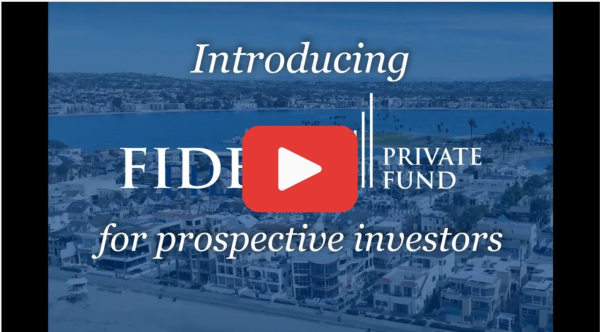Introduction
As economic headwinds intensify—from geopolitical tensions to shifting monetary policies—traditional portfolios built around public equities and fixed‑income instruments face mounting challenges. Stock markets can experience sudden drawdowns when corporate earnings disappoint or fears of a recession spike. Bond prices, while typically less volatile, are vulnerable to rising interest rates and inflationary pressures. Meanwhile, publicly traded REITs, often viewed as a hybrid between equities and bonds, can exhibit equity‑like swings even as they provide income. For income-focused investors—retirees, high-net-worth individuals, and those seeking a reliable cash flow—these dynamics underscore an urgent need to diversify beyond conventional assets. Private mortgage funds, such as Fidelis Private Fund, offer a compelling alternative: real-estate-backed loans with disciplined underwriting, conservative loan-to-value ratios, and consistent distributions that collectively enhance portfolio resilience and income stability.
The Problem with Traditional Strategies
Public Equities
Stocks have historically delivered long-term growth but can suffer steep corrections during market downturns. For example, during the 2008–2009 financial crisis, the S&P 500 plunged by more than 50%, while in 2022, the index tumbled over 20% amid interest-rate hikes and inflation fears. Such volatility can be particularly damaging for investors reliant on drawdowns for income or approaching retirement, as selling into a declining market may lock in losses and erode capital.
Investment‑Grade Bonds
Bonds serve as a ballast against equity risk, offering predictable coupon payments. Yet they are not immune to market forces: when central banks raise rates to combat inflation, bond prices fall, reducing total returns. In the first half of 2022, the Bloomberg U.S. Aggregate Bond Index returned nearly –10 %—one of its worst starts in decades. For investors counting on bonds for income, such losses can offset coupon yields and diminish purchasing power.
Public REITs
Real‑estate investment trusts (REITs) provide portfolio diversification and income generation through dividends. However, publicly traded REITs often track broader equity markets, exposing investors to the same systemic risks that affect stocks. During periods of heightened market stress, REIT share prices can plunge even if underlying real‑estate fundamentals remain intact, undermining both dividend stability and capital preservation.
The Role of Private Mortgage Funds
 Private mortgage funds—also known as trust‑deed or real‑estate debt funds—pool capital from accredited investors to originate senior‑secured loans against residential or commercial property. Key characteristics include:
Private mortgage funds—also known as trust‑deed or real‑estate debt funds—pool capital from accredited investors to originate senior‑secured loans against residential or commercial property. Key characteristics include:
- Senior‑Lien Security: The Majority of the Loans occupy first‑lien positions, granting investors priority claims on collateral in the event of borrower default. This seniority materially mitigates loss severity by tapping into substantial equity cushions before junior debt or equity holders are affected.
- Conservative Loan‑to‑Value (LTV) Ratios: Typical LTV thresholds range from 60 % to 70 %, ensuring that properties must depreciate significantly before investor capital is at risk. These buffers provide meaningful downside protection on both principal and interest payouts.
- Short‑Term Loan Tenors: With maturities generally between 6 and 24 months, funds can adapt more rapidly to evolving market conditions compared to longer‑dated bonds or direct real‑estate investments.
- Predictable Interest Distributions: Loans feature fixed or floating coupons—often in the 6 – 9 % range—paid monthly or quarterly. Floating‑rate structures frequently include a spread over benchmarks, allowing yields to adjust upward in rising rate environments.
- Relationship‑Driven Underwriting: Unlike purely algorithmic platforms, Fidelis’s underwriting team combines deep local market expertise with on‑the‑ground property inspections and borrower vetting, emphasizing collateral quality and exit strategies over volume lending.
By channeling investor capital into primarily first‑position real‑estate debt, private mortgage funds offer a distinct return profile uncorrelated with equity price swings or bond market fluctuations.
Strategic Value Within a Portfolio
1. Enhanced Diversification
Private mortgage funds exhibit low historical correlation to both traditional fixed income and equities. While stocks may plummet and bonds may lose value amid rate hikes, borrowers often refinance or prepay loans using equity gains or takeout financing. This dynamic provides liquidity to funds even as public markets struggle, smoothing overall portfolio volatility.
 2. Consistent Income Streams
2. Consistent Income Streams
With interest distributions paid monthly or quarterly, investors receive steady cash flows that are independent of dividend cuts that can occur during economic contractions. Moreover, floating-rate loans adjust yields in line with benchmark movements, offsetting the erosion of real returns during inflationary cycles and rising-rate regimes.
3. Downside Protection
Conservative LTV limits and comprehensive collateral appraisals create built-in buffers against declines in property value. In a severe market downturn, property prices would need to fall beyond these equity cushions before impairing investor capital. Further, first‑lien status ensures that, in a liquidated scenario, fund investors recover ahead of all subordinate stakeholders.
Fidelis’s Edge in Private Mortgage Funding
Proven Track Record & Transparent Reporting
Since its inception, Fidelis Private Fund has consistently demonstrated risk-adjusted performance, supported by quarterly audited statements and historical yield data. Investors can trace distributions and default resolutions with full transparency, fostering trust and informed decision‑making.
Common‑Sense Underwriting
Fidelis’s underwriting philosophy marries hard data with human insight. Loan officers conduct property walkthroughs, analyze local market trends, and assess borrower track records—ensuring that each loan stands on solid collateral fundamentals rather than purely statistical metrics.

After‑Improved Value Focus
Many funded projects involve renovation or repositioning, where improvements boost collateral value during the loan term. This “value‑add” approach further reduces downside risk: if a borrower defaults, the enhanced property can command a higher sale price, benefiting investors.
Relationship‑Driven Process
Longstanding partnerships with local brokers, construction professionals, and third‑party servicers grant Fidelis early visibility into project progress and market shifts. Proactive engagement allows for timely interventions—such as modified payment plans or strategic extensions—before collateral value is compromised
Smart Diversification Principles
When evaluating private mortgage funds, apply these guiding principles to ensure alignment with your portfolio objectives:
- Transparency & Reporting: Opt for managers who deliver detailed, periodic disclosures on portfolio composition, performance metrics, default statistics, and underlying collateral valuations.
- Loan Quality & LTV Discipline: Verify average and maximum LTV ratios; lower LTVs signal stronger equity buffers. Review appraisal methodologies and market comparables used to determine collateral values.
- Manager Experience & Track Record: Prioritize fund sponsors with demonstrable expertise in real‑estate lending, asset management, and workout scenarios. A seasoned team can navigate market cycles more adeptly.
- Fee Structure & Alignment: Compare management and performance fees against net yields. Ensure fee models reward preservation of capital and sustainable income generation rather than high‑volume origination.
- Liquidity & Redemption Terms: Understand lock‑up periods, withdrawal windows, and gate provisions. Align fund liquidity with your cash‑flow requirements, balancing higher yields with potential temporary illiquidity during stressed markets.
By rigorously vetting funds against these criteria, investors can harness the diversification and income benefits of private mortgage investing while proactively managing risk.
Case Illustration: Rising‑Rate Environment
 Consider a hypothetical rising‑rate scenario: benchmark interest rates climb by 2 % over 12 months. Traditional bond holdings may lose 10 – 15 % of market value, eroding portfolio stability. Equity markets could face heightened volatility as cost of capital rises. In contrast, a floating‑rate private mortgage fund with a 5 % spread over the benchmark would see coupon yields increase in tandem, preserving—and potentially enhancing—income streams. Short‑term loan maturities allow reinvestment at higher prevailing rates, further reinforcing the resilience of mortgage fund returns.
Consider a hypothetical rising‑rate scenario: benchmark interest rates climb by 2 % over 12 months. Traditional bond holdings may lose 10 – 15 % of market value, eroding portfolio stability. Equity markets could face heightened volatility as cost of capital rises. In contrast, a floating‑rate private mortgage fund with a 5 % spread over the benchmark would see coupon yields increase in tandem, preserving—and potentially enhancing—income streams. Short‑term loan maturities allow reinvestment at higher prevailing rates, further reinforcing the resilience of mortgage fund returns.
Conclusion & Call to Action
In an era defined by unpredictable equity gyrations, rate‑sensitive bonds, and equity‑like REIT performance, private mortgage funds stand out as a core portfolio diversifier. By delivering reliable, real‑estate‑backed income, conservative downside protection, and uncorrelated returns, funds like Fidelis Private Fund empower investors to build recession‑resilient portfolios that weather market storms.
If you’re looking to strengthen your portfolio with consistent, asset‑backed income, call Fidelis Private Fund at 760‑258‑4486. Let’s explore whether our approach is the right fit for your financial goals.
Explore how Fidelis can support your growth with flexible, fast financing solutions tailored to your needs.
See Our Latest Performance Report
 Fidelis Private Fund annualized yield paid to Limited Partners for the 1st Quarter 2025. Click here for a summary of Fidelis’s annualized yield since inception.
Fidelis Private Fund annualized yield paid to Limited Partners for the 1st Quarter 2025. Click here for a summary of Fidelis’s annualized yield since inception.
 Fidelis 2028 Vivid Vision – Where are we going and how are we going to get there!
Fidelis 2028 Vivid Vision – Where are we going and how are we going to get there!
The Fidelis 2028 Vivid Vision document provides a comprehensive blueprint of the company’s strategic direction, core values, and operational principles, highlighting its commitment to capital preservation, growth, innovation, and client-centric services. Click to read the Fidelis vision.



